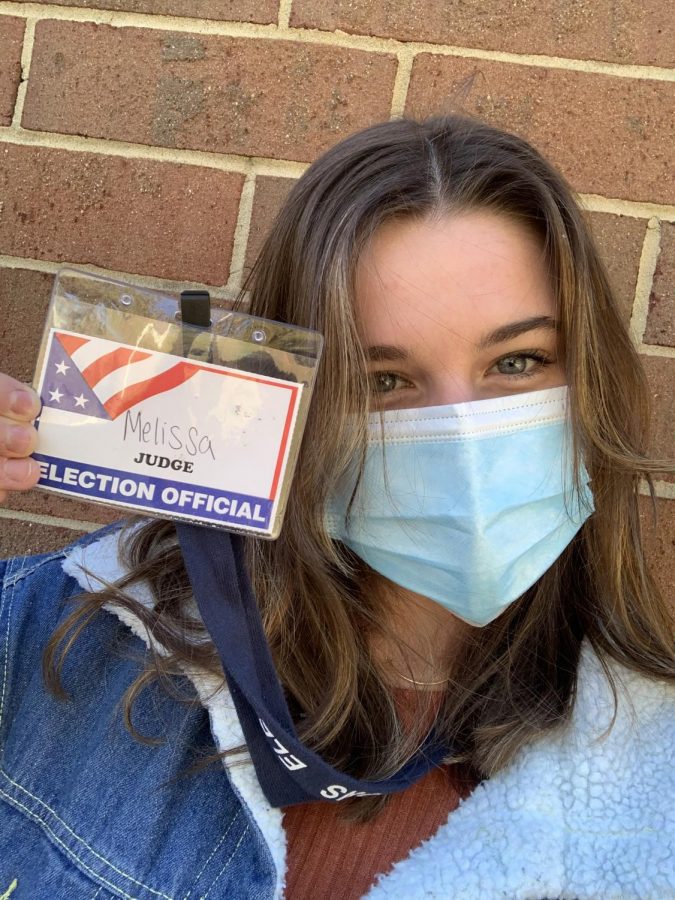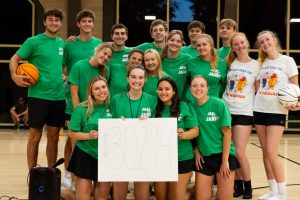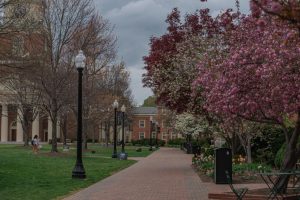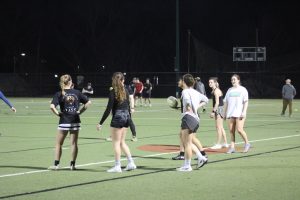Sustaining democracy: a poll worker’s experience
Staff writer Melissa Cooney shares her experience working as a poll worker in a pivotal election year
Cooney worked as a judge at the 203 precinct in Winston-Salem during the election (Melisa Cooney/Old Gold & Black)
November 5, 2020
I spent most of the fall feeling frustrated, knowing that I had the privilege of voting, but not knowing how much of an impact I would actually make. There’s something so powerless about the election. Your vote counts, there’s no doubt about it. But I still needed to do more.
After listening to my favorite comedy podcast Girls Gotta Eat and learning that one of the hosts had signed up to be a poll worker, I was intrigued. This is my first time voting in a general election. I have, however, voted in the 2018 primary elections and I have attended polling places with my mom when I wasn’t of age. The poll workers always seem to be on the older side, and it was surprising to me to hear that this cool 28-year-old podcast host in Manhattan would be working the polls.
I had no idea how necessary poll workers actually were until I did some research. The thinking goes like this: the more people they have working the polls, the more polling places can open. Opening more polling places allows for shorter lines, a greater ability to reach marginalized communities and subsequently less voter suppression. Not only that, but in the middle of the COVID-19 pandemic, poll workers are more important now than ever. Traditionally, the majority of poll workers are retired or older Americans. Now, it just so happens that this age group is extremely susceptible to contracting the virus and are more likely to suffer from it than their younger counterparts.
So just like that, I applied on the Forsyth County Board of Elections website. Just a few days later, I got a call from a representative who had told me that my application had been passed, and that I would be an “alternate.” This meant that I would definitely be working on Election Day, but I wouldn’t know what precinct I would be at until midnight the night before election day or in the early morning of election day. This is because the board of elections expected people to not show up at the last minute, and needed people on call ready to go if this happened. I agreed, and signed up for a three hour training session at the Forsyth County Department of Agriculture building.
My training was on Oct. 28, and it was surprisingly in person. I received a large spiral book of information on how to work the polls, and received training for both the judge and election assistant positions of Poll Working. Because I was an “alternate,” I had to be ready for either position. I left the training feeling a combination of nerves and excitement. This was the first timethe importance of the job hit me. There is really no room for error, because every vote is important and needs to be accurately accounted for. This important role requires a large amount of volunteers. In 2016, the nation needed one million poll workers, according to TIME.
I could not sleep the Monday before Election Day. It was midnight, and I still had not gotten a call. I was told to be up and ready by 6 a.m., so I set my alarm for 5:50 a.m. and headed back to sleep. I was so jittery and anxious that I woke up once an hour and checked my phone to find no phone calls. Even when my alarm finally went off, I still had no information from the Board of Elections. Once 7 a.m. rolled around, I was convinced that I wouldn’t be working because the polls had already opened at that point.
At 7:17 a.m., I got a phone call. I was told to report to the Martin Luther King Community Center on Pittsburgh Avenue right here in Winston-Salem. This is precinct 203 — where over 1,000 votes were cast in total — and a judge and an election assistant had not showed up for Election Day.
Once I got there, I met the chief judge (who is basically the head poll worker) and was told that I would be one of two judges that day. There were seven poll workers in total, along with two Poll Watchers and some volunteers outside.
This polling place was a standard recreational center sized gymnasium, and it was extremely spread out. Everything was socially distant, every poll worker had a mask on (as did most of the voters), the door was wide open to the outdoors, and I felt extremely safe — which was a huge relief.
I was assigned to the ballot table. My job was to receive each voters’ “Authorization to Vote” form (we called them ‘ATVs’), give them the appropriate ballot depending on where they live in the precinct, and then numerically count how many voters had received a ballot up to that point. I was also responsible for “spoiling,” or discarding, any ballots that needed to be discarded. Most of the time, this happened when voters wanted to redo their ballot because they had bubbled the wrong person in.
There were very few lines and the wait time was never long for the voters, no matter when they came in. I worked with a great group of people — all of us poll workers worked hard and got the job done.
In total, as seen on the Forsyth County Board of Elections website, Precinct 203 had 223 people cast votes on election day. Most of the precinct had already voted through absentee ballots or during the early voting period time as well. In Forsyth County, over 124,000 people voted absentee, compared to just under 30,000 on election day.
It was a pretty tiring day. I was there from around 8 a.m. until around 9:15 p.m. and we all basically remained in our spots for the majority of the day. However, leaving my polling place after working all day was an extremely gratifying feeling. I knew for a fact that every person who came through Precinct 203 was going to have their votes counted accurately, and it is an amazing experience to be confident in you and your team’s hard work as the election results came in throughout the evening.
I would absolutely recommend being a poll worker for any election in your local area. Not only do you get paid, but it is seriously such an important part of our democratic process here in the United States. I had no idea how much of a role poll workers play, and I have so much respect for all of the people who spent day after day during the early voting period, in the middle of a pandemic, to ensure that those votes were counted for, too. Poll working is an awesome way to get involved in democracy past just voting yourself, and I think everyone should experience it at least once.













